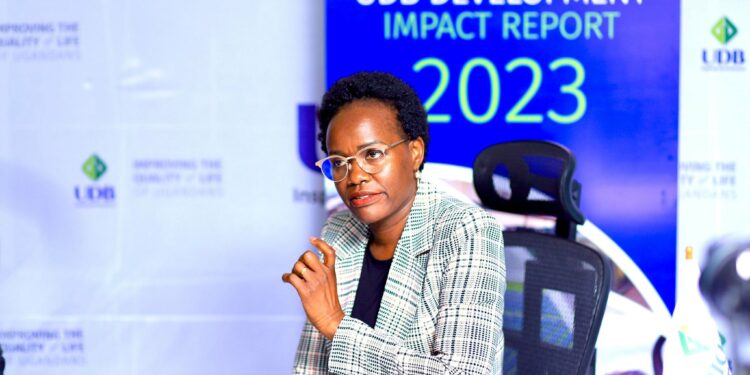In a monumental achievement, Uganda Development Bank’s (UDB) plethora of financial initiatives has enabled various businesses in Uganda to launch and expand into major enterprises.
These initiatives, coupled with non-financing activities, were designed to create significant social and economic impacts across the nation, according to the 2023 UDB Development Impact Report.
The report, themed “Transforming Lives: The Role of UDB in Driving Socio-economic Transformation in Uganda,” was launched on Friday. It highlighted their success in job creation, output value, foreign exchange earnings, and tax contributions from the supported enterprises.
One of the most remarkable highlights from the financial performance report was the creation and maintenance of 51,841 jobs, contributing to an impressive total output value of 5.8 trillion shillings. Notably, in 2023 alone, lent over 600 billion shillings to various projects and facilitated the creation of 3,959 jobs. These figures underscore the bank’s pivotal role in fostering employment and economic growth.
“Our financial and non-financial interventions are designed to deliver high socio-economic value, including job creation, increased production output, and foreign exchange earnings while contributing to government revenues through tax,” said Patricia Ojangole, the Managing Director of UDB.
The UDB reported an increase of 404 jobs compared to the previous year, with 41.21% being permanent. The majority of temporary jobs, 41.5%, were in the primary agriculture sector, reflecting the seasonal nature of agricultural activities.
Francis Mwesigye, UDB’s Chief Economist, noted that most of these jobs benefited the youth, a demographic severely affected by unemployment, and many of these positions were instrumental in lifting individuals out of poverty.
The bank’s focus on affirmative action yielded notable results: 33% of shareholders were youths, 39% were women, and 0.2% were persons with disabilities. Moreover, there was a significant increase in the number of women in senior managerial positions, rising from 37% to 43%, while youths occupied 29% of senior managerial roles and 19% of board memberships. This progress underscores UDB’s dedication to promoting inclusivity and supporting SMEs.
UDB-supported enterprises posted a remarkable 869% profitability, with health and agriculture projects yielding higher margins compared to tourism and hospitality. Mwesigye highlighted that job quality was also assessed by the social benefits provided, such as social protection.
In 2023, supported enterprises generated approximately 236 billion shillings, with the manufacturing sector contributing 47%, agro-processing 27.8%, and primary agriculture 15%. These sectors played crucial roles in boosting the national economy.
Contribution to GDP and Export Growth
The bank’s impact extended to the national GDP, with an estimated contribution of 5.8 trillion shillings, or 3.2% of GDP. Despite limitations in data availability, the report highlighted a 47% increase in earnings from locally produced export products, driven by manufacturing and agro-processing. Two-thirds of raw materials used in UDB-funded enterprises were locally sourced, showcasing the growing strength of Uganda’s industries.
UDB’s commitment to environmental sustainability was evident, with 72% of assessed enterprises being NEMA-certified in 2023, up from 56.5% in 2022. Enterprises embracing renewable energy emitted significantly lower carbon footprints compared to those using non-renewable sources. The report stressed the urgency of transitioning to cleaner energy sources, particularly in infrastructure projects.
UDB’s focus on human capital development included constructing infrastructure for education, particularly in underserved areas. In 2023, the bank’s interventions increased enrollment in supported institutions to 480,062 learners, with 60% being female and 1% persons with disabilities.
The health sector also saw significant improvements, with 61 intensive care units installed and the number of beds tripling to 388. The number of medical workers in supported health centers increased from 263 to 593, and the cumulative number of patients more than doubled to 248,000.
UDB plans to continue its efforts in promoting sustainable waste management, prioritizing waste reduction, recovery, reuse, and recycling. The bank remains steadfast in its mission to drive socio-economic transformation in Uganda, ensuring a prosperous and sustainable future for all its citizens.
Do you have a story in your community or an opinion to share with us: Email us at editorial@watchdoguganda.com











